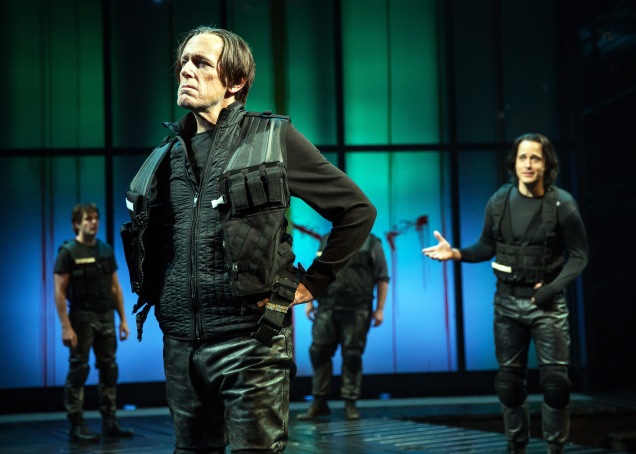
Tug of War: Civil Strife is the second of Barbara Gaines’ two ambitious Shakespeare trilogies produced for Shakespeare 400 Chicago. This second set of plays concentrates on the bloody civil wars that resulted when Henry V’s early death led to his infant son Henry VI taking the throne at the age of only nine months old, provoking a power struggle among the leading nobles, most of them Henry’s kinsmen. Gaines characterized the first trilogy, about England’s wars with France as “suffused with ghosts,” whereas this trilogy on the English civil wars as “suffused with blood.” She effectively evokes this idea with a backdrop that looks like a large glass window with blood dripping down it more and more as the death toll rises.
As in the first trilogy, Gaines puts her focus on the terrible waste of war and how most of that cost is paid by the common soldiers. To that end she adds a prologue scene of a young soldier leaving for war and the sweetheart he leaves behind. As he departs, he sings the first of many evocative songs Gaines has added to the play, “Remember me.” Throughout the trilogy, we follow this young man who appears as a foot soldier, messenger, and finally a reluctant assassin, as he is increasingly implicated in the dirty business of war. At the end of the play, the soldier returns to his sweetheart, but in a wheelchair, and with both legs missing. Instead of a tender reunion, he repudiates her affection, and is wheeled off stage by his fellow soldiers. These silent tableaux underline the special brutality of civil war. On this point, Shakespeare and Gaines are totally in sync, as in a scene where the helpless Henry VI watches as a father unwittingly kills his own son, and a son his father in battle, only recognizing their victims when they loot the corpses.
In the first part of the trilogy, we watch as several nobles, including Henry’s new Queen Margaret, conspire to get rid of the Lord Protector, known to the people as the good Duke Humphrey, one of the few characters in these plays who actually cares about the welfare of the state. Henry’s haplessness is apparent in the scene where the conspirators have the Duke arrested and the king, though sure of his innocence, passively lets it happen and hopes for the best. As the good Duke leaves the stage for the last time he begins to sing Leonard Cohen’s “Alleluia,” which is effectively echoed later in the play by Henry. After Duke Humphrey’s downfall, the conspiracy falls apart, with the Bishop of Winchester almost immediately dying a horrific death in his bed on the stage, which the pious Henry views as a judgment on him.
Soon we see one of the conspirators, Richard, Duke of York (Larry Yando) emerge as a rival to the throne. Yando plays him as a canny, amoral politician, a strong alternative to the weak and ineffectual Henry. In an ahistorical but effective garden scene, Shakespeare had York challenge a group of nobles to take sides, plucking a white rose to support him or a red (Lancastrian) rose if opposed. In an aside to the audience, York reveals that he has fomented dissent in England by egging on a commoner named Jack Cade to lead a rebellion. Gaines stages this rebellion as a modern populist revolt. Actor Kevin Gudahl has a field day portraying Cade as a vain populist à la Donald Trump, who intends to get rid of intellectuals and “kill all the lawyers.” After Cade’s rebellion is put down, the Yorks and Lancasters are in open warfare, with scenes of increasing violence and torture, culminating in Margaret tormenting the prisoner York by putting a paper crown on his head and offering to wipe his face with a handkerchief stained in the blood of his young son, before killing him and putting his head on a spike.
But in the latter half of the trilogy, York’s sons, along with their great ally the Earl of Warwick (Gudahl again) are ascendant, with Richard’s son Edward eventually taking the throne. In one of the most affecting scenes in the production, Edward’s brother Richard takes it upon himself to personally execute King Henry, now imprisoned in the tower. But Henry, movingly portrayed by Steven Sutcliffe, finally comes into his own in this scene. No longer wearing a crown, but rather shabby prison clothes, he finally looks the ascetic holy man he has always been. He prophecies Richard’s bloody future path to the throne, also recounting his past, until Richard, who seems genuinely affected by Henry’s words, strangles him in a spasm of anger.
In the final part of the trilogy we see the rise of the scheming Richard, who first arranges the murder of his turncoat brother Clarence. After his other brother King Edward dies (of natural causes), Richard becomes Lord Protector and gradually eliminates every person between himself and the throne, including his young nephews, Edward’s sons. Here too, Shakespeare’s sensibility and Gaines production are in sync, for both show us a world in which anyone with a sense of honor has long since been eliminated by those who are more ruthless. Only those like Richard who can lie and betray without remorse survive and thrive.
But at the very end of the trilogy Shakespeare offers some hope, in the form of an army raised by Henry Tudor, the earl of Richmond and grandfather of Shakespeare’s own monarch, Elizabeth I, that defeats the villainous Richard. In a night scene before the decisive battle, Gaines contrives a great coup de théâtre, when the ghosts of all Richard’s victims return to him in a dream, their faces projected on the screen of blood behind the stage. The same spirits seem to have blessed Henry Tudor, so that even before the battle takes place it is clear that Fate will be one his side. In her added epilogue, however, Gaines plays against the Tudor propaganda of this “happy ending” by bringing us back to the young soldier in a wheel chair with his PTSD. As we leave the theater, we are left with the sickening feeling that nothing has been fixed at all, that those in power will continue their wrangling and the commons will continue to suffer and die for it.

Cynthia Rutz is an instructor and past chair of University of Chicago’s Basic Program of Liberal Education, a great books discussion program for adults. She also teaches at and is Director of Faculty Development for Valparaiso University. She earned her PhD from the University of Chicago, with her dissertation on Shakespeare’s King Lear and its folktale analogues. She received her BA in mathematics and philosophy from St. John’s College, Santa Fe, New Mexico.
